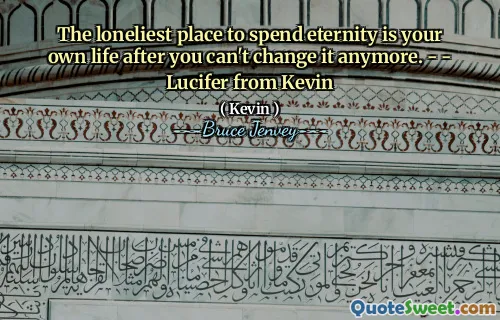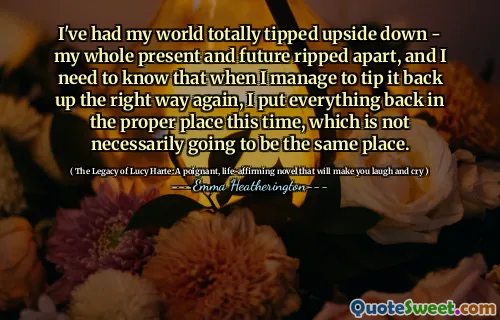
The loneliest place to spend eternity is your own life after you can't change it anymore. - - Lucifer from Kevin
This quote resonates deeply with the human experience of regret and acceptance. It suggests that the most profound loneliness isn't necessarily the physical solitude we might encounter, but rather the emotional and psychological isolation that erupts when a person becomes trapped in a life they feel powerless to change. Often, people go through periods of deep reflection and plunge into regret about choices made in the past, missed opportunities, or unfulfilled ambitions. When change seems impossible—whether due to circumstances, age, or personal limitations—such feelings can intensify, creating a sense of solitude that is both devastating and inescapable.
The mention of Lucifer adds an interesting layer, often associated with themes of temptation, fall, and rebellion against constraints. Perhaps it symbolizes the internal struggle against submission to circumstances and the allure of change or rebellion, which ultimately might seem unattainable. The quote also underscores the importance of making conscious choices while there's still time — to avoid the haunting loneliness of unchangeable regret.
Reflecting on this, one can appreciate the importance of living a life aligned with one's values and aspirations, knowing that acceptance is key when faced with unavoidable realities. Yet, it also invites introspection on the human fear of irreversibility, and how this fear can sometimes paralyze us, trapping us in a cycle of despair. The message is a poignant reminder that the true loneliness isn't just the physical separation from others, but the emotional estrangement from oneself caused by resignation and the inability to forge new paths. Ultimately, it pushes us to cherish opportunities and foster resilience to confront life's inevitable challenges with courage, so that we do not find ourselves in a solitude that is more devastating than any physical emptiness.






